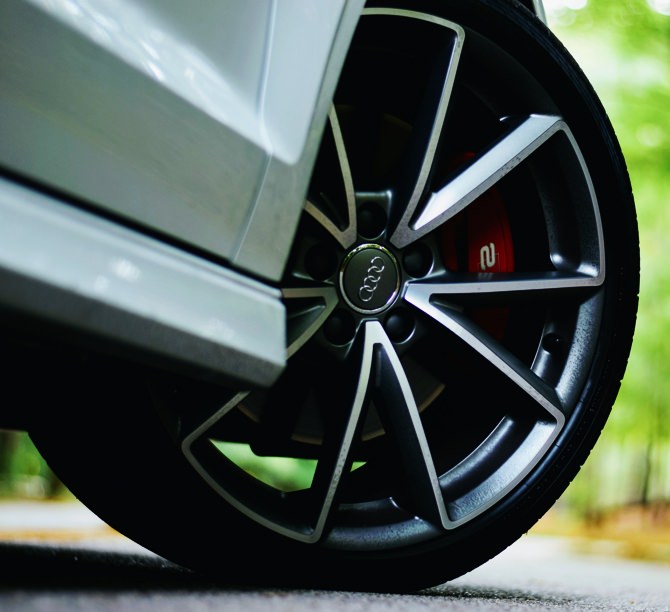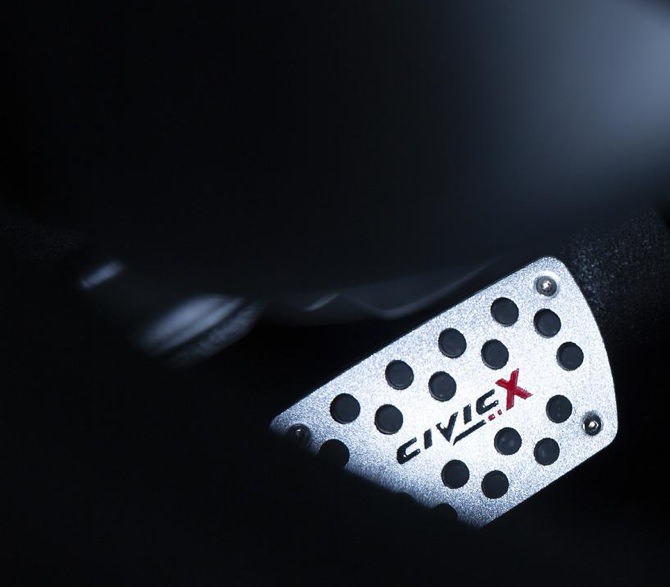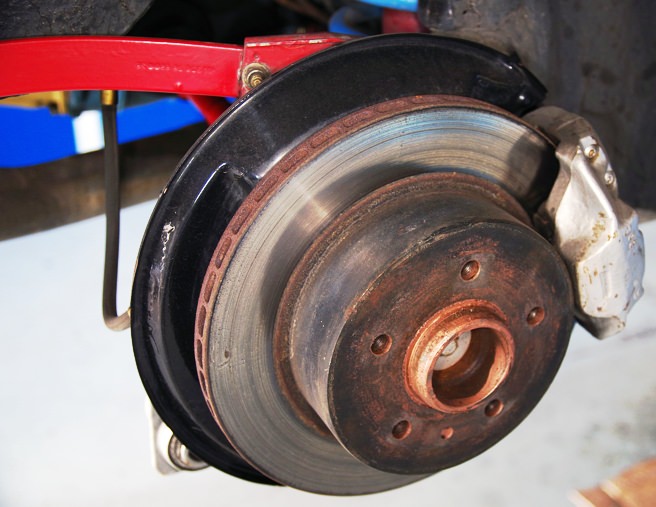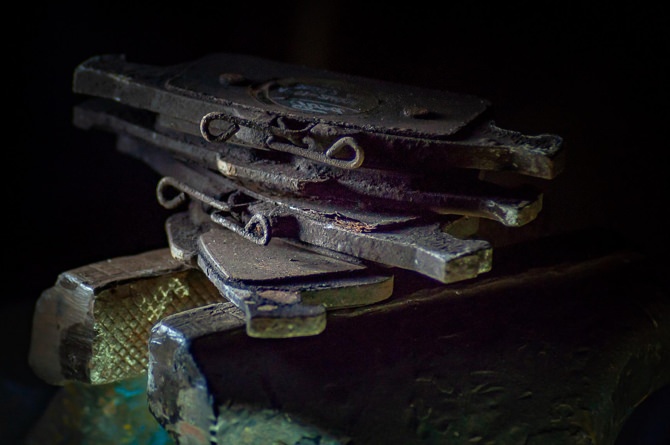The Signs You Need To Inspect or Replace the Brakes on Your Vehicle
 As we drive, our vehicle is subject to wear and tear but what are the signs we need new brakes or need to fix them? Continue reading to find out.
As we drive, our vehicle is subject to wear and tear but what are the signs we need new brakes or need to fix them? Continue reading to find out.
As your trusty Brantford mechanic, we’ve decided it’s a good idea to put this information out there for people who are curious as to why their brakes are acting up. A failing brake system is dangerous and shouldn’t be ignored.
What and Where Are My Brake Pads
Your vehicle brakes are not hidden somewhere obscure under the hood of your car—they’re actually quite easy to find. Depending on the type of wheel rims you have, you may be able to examine them yourself and see if there are any signs they need replacing.
To actually get an accurate account of whether they’re safe and usable, you need to take off your tires and look directly at your brake pads, or just take your vehicle to a mechanic for a professional inspection.
Can My Car Problems Be My Brakes?
It’s quite possible. Here’s a summary of signs your brakes need to be looked at by a mechanic. The signs your brakes should be fixed or replaced are as follows:
- Deep Grinding When You Brake
- High Pitched Sound When You Brake
- Your Brake Petal Vibrates When You Push Down
- The Thickness of Your Brake Pads Have Depleted
- You See the Indicator Light Go On
- You Hear Clicking When You Brake
- It Takes a Long Time to Come to a Complete Stop
- Your Car Veers Left or Right When Braking
- Fluid Puddles Under Your Car
- Long Term Storage
These potential brake issues are further summarized below with more details.
Why Are My Brakes Acting Up?
 For your brakes to work properly they depend on several components—the brake pedal, the brake lines, brake fluid, the drums, the discs, the master cylinder, the rotors, calipers and if applicable the brake booster.
For your brakes to work properly they depend on several components—the brake pedal, the brake lines, brake fluid, the drums, the discs, the master cylinder, the rotors, calipers and if applicable the brake booster.
When any of these components has failed or are not working properly, your brakes can act up and give you signs they need fixing. A failing brake system is not to be taken lightly and should be addressed by a mechanic as soon as you discover a problem.
Signs You Need New Brakes
There are a number of sure signs you can look out for that will tell you that your brakes need to be replaced. If you see or hear any of these signs, make sure to call your local mechanic right away to get your vehicle into the shop for brake repairs.
Brake failures accounts for approximately 2% of car crashes every year in the US and we can safely assume the statistics are the same or quite similar in Canada. It’s not a rampant issue, but brake failure while driving does happen and is dangerous.
Deep Grinding When You Brake
One of the first signs your brakes have issues is when you feel a grinding when you push on the brakes. When every part of our vehicle is operating properly, our drive is usually smooth and carefree but when our brakes start wearing out we usually feel and hear a grinding when we brake while driving.
If you feel a grinding when you put on the brakes, drive your vehicle to your mechanic as soon as possible.
High Pitched Sound When You Brake
We all have been driving and hear a loud screeching sound when the car next to us puts on the brakes. If this is happening, it’s another sign that your brakes need to be looked at by a mechanic. When you hear a high pitched squealing sound as you brake, it’s usually a sign that your brakes need replacing and that you should make an appointment with your mechanic as soon as possible.
A high pitched sound could be the result of moisture and other weather conditions, and may not mean that it’s urgent your brakes are looked at, but these are situations where only a mechanic can determine for sure.
Your Brake Petal Vibrates When You Push Down
Do you feel your brake petal vibrating when you hit the brakes? If so, this is usually a sign that your brake pads have worn out. When you feel this type of vibration you should make an appointment with your mechanic in order to avoid any further damage and to have your brakes checked right away.
The Thickness of Your Brake Pads Have Depleted
 A healthy and safe thickness for vehicle brakes are more than 1/4 thick. To measure the thickness of your brakes you can do it by eye, but it’s better if you grab your tape measure and get an accurate reading.
A healthy and safe thickness for vehicle brakes are more than 1/4 thick. To measure the thickness of your brakes you can do it by eye, but it’s better if you grab your tape measure and get an accurate reading.
Take a look at the brake pad on the rotor of the tire and if it looks less than a 1/4 of an inch thick, it means your brakes are getting old and need to be replaced soon. You can replace the pads yourself but if you’re unable to just ask your mechanic.
You See the Indicator Light Go On
Obviously if the brake indication light goes on, your brakes are not in the best condition. Not all vehicles have a brake indicator light so if yours doesn’t, you’ll need to rely on some of the other signs we listed to determine if you need new brake pads.
The indicator light will usually go off once your brakes reach a certain lack of thickness and if this happens, it’s time to bring your car to your mechanic for an inspection.
You Hear Clicking When You Brake
When the components in your braking system become loose or worn down, you may start to hear a clicking sound when you brake. You may have loose brake pads, loose calipers, bent brake plates or even debris between your brake calipers and the wheel. At this point your brake pads may be damaged and they’ll begin to rattle when the brakes are pushed and/or even released.
If you hear a clicking sound as you brake or release, it could also be another problem like a worn out wheel bearing or an issue with your brake lines. The only way to find out for sure, is to have your mechanic look at them during a brake inspection.
It Takes a Long Time to Come to a Complete Stop
This happens after having to apply the brakes over a long distance before the car fully stops. You can feel it more when you’re driving downhill or on the highway. When the brake pads are worn, they can’t generate enough friction to easily stop the vehicle and your vehicle can’t come to a complete stop as quickly as it used to. When your brakes are worn to this point, it’s time to make an appointment with your mechanic so they can determine if you need new brake pads installed.
Your Car Veers Left or Right When Braking
If your vehicle veers to the left or right when you’re braking, one of your brake pads has substantially depleted more than the other one. It can also be caused by a malfunctioning caliper within your braking system. There could be several other causes of the veering not related to your brake system but only a qualified mechanic can know for sure. This veering can be quite dangerous, especially of other parts of your brakes are failing and should get the attention of a mechanic immediately.
Fluid Puddles Under Your Car
If you’re experiencing some of the other issues above when driving, and you see spots of fluid on your driveway or wherever else you park your car, your brake line could be leaking fluid. Brake fluid leaks can be caused by general wear, rusting, pitting and/or a leak in the brake hydraulic system. In any event, all cases of leaking fluids should be addressed by your mechanic before your brakes completely fail on you.
Long Term Storage
 If your vehicle has been stored for a prolonged period of time, it may experience brake failure when you drive it again. Brake components can rust, the brake fluid can deplete, the brake line can get stuck, and an array of other issues can arise after storage.
If your vehicle has been stored for a prolonged period of time, it may experience brake failure when you drive it again. Brake components can rust, the brake fluid can deplete, the brake line can get stuck, and an array of other issues can arise after storage.
If after long term storage you start experiencing strange brake issues, drive your vehicle to your local mechanic to have it looked at before trying to drive any further.
Read the proper way to prepare your vehicle for long term storage so you can avoid any brake or other automotive issues once you drive it again.
Use The Emergency Brake When Parking
One good way to ensure your brakes work properly if your car hasn’t been driven for a long time is to pull the emergency brake when parking. This will reduce the chances of your brakes seizing in the future and keep it safe from moving when it’s parked. Don’t pull your emergency brake too hard. Just a simple pull to the position where it stops is the proper way of pulling it.
The Take Home
Like every other part of your vehicle, always monitor and be aware of your brakes. If you sense that something is wrong with them but you don’t know where to look, just do the right thing and have your brake mechanic inspect them. They’ll assess for any problems, and something is wrong, they’ll give you a quote and a plan of action for fixing them.
Leave a Reply